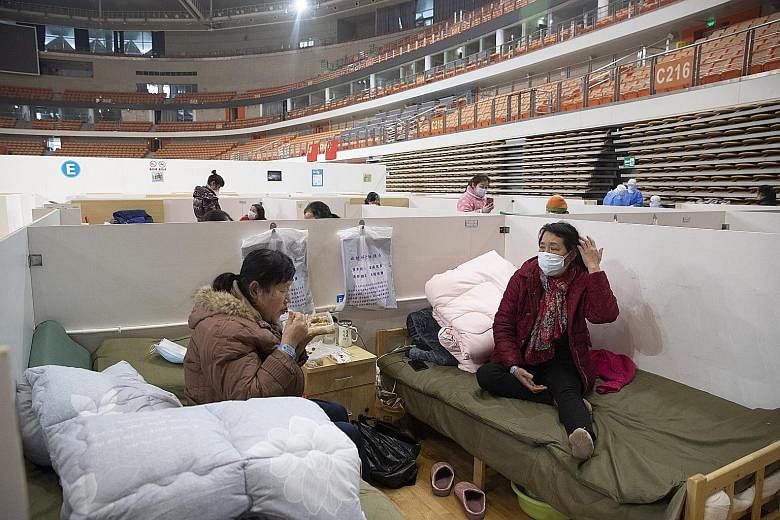SHANGHAI/BEIJING • The number of new coronavirus cases in China fell yesterday and a health official said intense efforts to stop its spread were beginning to work.
The coronavirus has presented the ruling Communist Party with the huge challenge of stamping it out while at the same time minimising damage to the world's second-largest economy.
China's latest figures showed 68,500 cases of the illness and 1,665 deaths, most of them in Hubei.
The National Health Commission yesterday reported 2,009 new cases, down from 2,641 the previous day, and 142 new deaths, just one lower than the 143 on the previous day. All but four of the new deaths were in Hubei.
The province and its capital, Wuhan, have been virtually sealed off and locked down since Jan 23, with schools, offices and factories shut and most travel suspended.
The virus is believed to have an incubation period of 14 days, which would appear to indicate that it has been spreading since the lockdown was imposed.
But health commission spokes-man Mi Feng said the campaign was beginning to show results. "The effect of the coronavirus controls is appearing," he told reporters.
Increased medical support and preventive measures in Hubei had headed off more critical cases and the proportion of critical cases among confirmed cases had fallen to 21.6 per cent on Saturday from 32.4 per cent on Jan 27, Mr Mi said.
Mild cases were also being treated more quickly, preventing them from becoming critical, Mr Mi said.
Nevertheless, restrictions were tightened in Hubei yesterday with a ban on vehicles, apart from essential services, and companies told to stay shut until further notice.
Outside mainland China, there have been about 500 cases in some two dozen countries and territories, with five deaths - in Taiwan, Japan, Chinese-ruled Hong Kong, the Philippines and France.
Taiwan, which has 20 confirmed cases, reported its first fatality yesterday. Health Minister Chen Shih-chung said it was a man in his 60s, who had not travelled abroad recently and had diabetes and hepatitis B. The man was a taxi driver whose customers were mainly from Hong Kong, Macau and mainland China. One of his family members was also confirmed to have the virus. The pair constituted Taiwan's first local transmission cases, the minister said, adding that the authorities were trying to find out the source of contraction.
The biggest cluster outside China has been on the Diamond Princess cruise ship quarantined off Japan's Yokohama, with 70 more cases reported yesterday, taking the total to 355 of the roughly 3,700 passengers and crew on board.
Another cruise ship, Holland America's MS Westerdam, docked in Cambodia last Thursday after being rejected by ports in several other countries and territories. The ship was believed to be free of the virus but an 83-year-old American woman from it tested positive upon arriving in Malaysia, the authorities there said. Cambodia urged Kuala Lumpur yesterday to "double-check" the diagnosis, but Malaysian Deputy Prime Minister Wan Azizah Wan Ismail said the woman had already been tested twice.
The first fatality in Europe was an 80-year-old Chinese man who died at a Paris hospital, the authorities said on Saturday. Dr Robin Thompson, an expert in mathematical epidemiology at Britain's University of Oxford, said that with nearly 50 cases in Europe, a death was not surprising. "There still hasn't been sustained person-to-person transmission in Europe," he said.
While some hope that the disease may be peaking in China, a trend has been hard to discern, especially after a reclassification that widen-ed the definition of cases.
World Health Organisation chief Tedros Adhanom Ghebreyesus said on Saturday it was impossible to tell where the epidemic will spread.
REUTERS, AGENCE FRANCE-PRESSE











